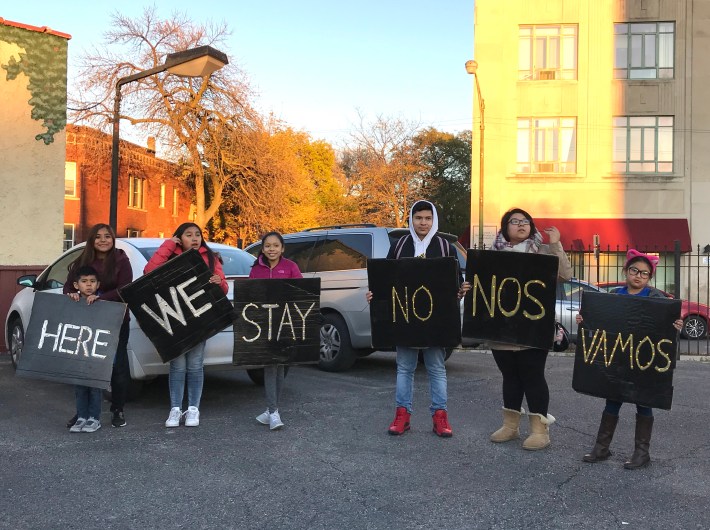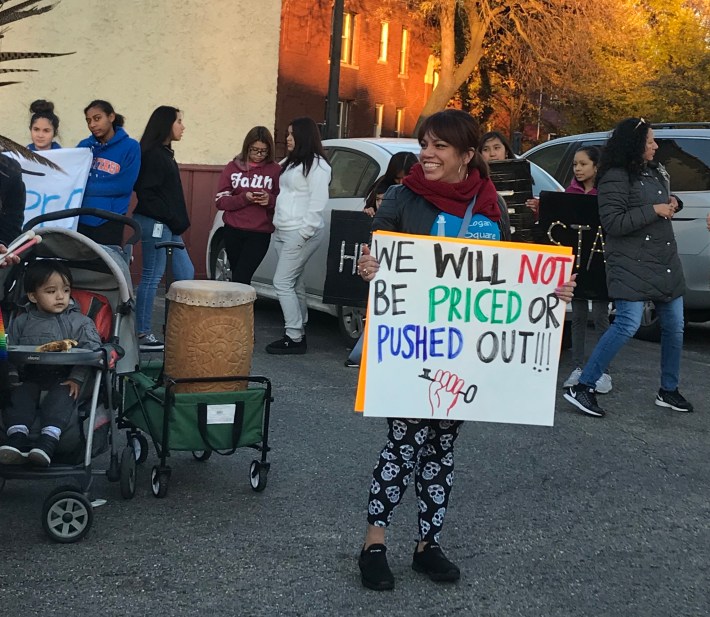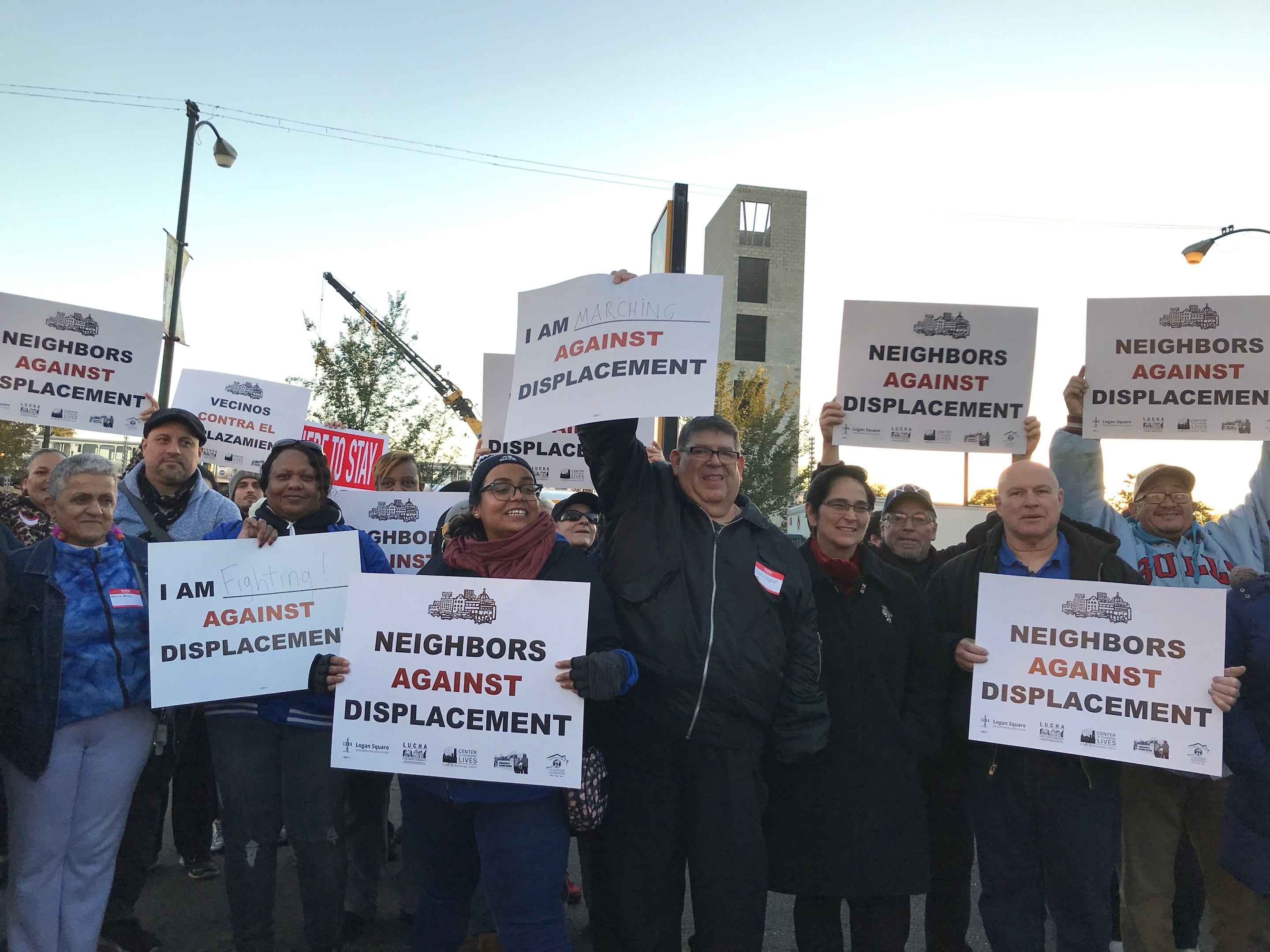Last week hundreds of people gathered at the Father and Son restaurant parking lot near Milwaukee and Sacramento in Logan Square for a March for Racial Equity, demanding solutions to the neighborhood's displacement crisis, including affordable transit-oriented development. March organizers included Center for Changing Lives, Chicago Teacher’s Union, Logan Square Neighborhood Association, Somos Logan Square, and LUCHA.
The demonstrators called on community members to vote out elected officials who aren't doing enough to prevent longtime residents from being priced out of the community. From 2000-2014, the Latinx population in Logan Square fell by 19,200, according to U.S. Census data. In 2017, Logan Square had the most buildings demolished, according to Chicago Cityscape, a website that tracks development, run by Streetsblog's Steven Vance. In addition to equitable TOD with units large enough for families, the marchers were pushing for legislation to make home ownership affordable for low-income families, and higher demolition fees for developers that would be used to fund affordable housing.
Before the march took off, LSNA youth leaders led chants emphasizing the 19,200 figure. Aztec dancers also performed for the crowd gathered at the parking lot.

After the brief presentation, the rally began marching northbound on Milwaukee. The march stopped at the Emmett Street parking lot, which has long been discussed as the site for a 100-percent affordable housing development.
A small stage was set up at the parking lot and speakers took the stage during their brief program. Jhoanna Maldonado, Yates Elementary School teacher and vice-president of the board of LSNA, spoke to the crowd. “I stand here proudly with everyone that cares," she said. "We are the warriors of change. Too often we are told there is nothing we can do, but here we are doing it, changing the narrative about our community, about our schools.”
Maldonado stressed that gentrification and displacement is not an inevitable process and emphasized the intersections between the process and housing, education, and healthcare. “For the last 18 months, we have been working on solutions for housing, immigration, economic development, and our West Logan Square and Hermosa quality of life plan,” she said. “And we need leaders who are going to take our communities seriously and implement solutions. Today we march, but tomorrow we vote. We are all going to get our families to vote.”

Mauricio Segovia, principal of Darwin Elementary School in Logan Square, also spoke onstage. “I am here to speak on behalf of my community school, Darwin Elementary School,” he said. “When I came to Darwin in 2009, my school had over 900 students. Today, we have a little over 550 students. That’s not right!”
Segovia discussed the intersection of displacement and the population at his school, a topic covered by Block Club Chicago this past summer. “We have lost over 350 students in our school community,” he said. “Families have been moving out of Logan Square because they’ve been pushed out of their homes.”
Segovia added that affordable housing is what the community needs to ensure families can stay in the neighborhood and schools like Darwin. “As I see my little ones coming into the school, I wonder, are they going to have a chance to graduate from Darwin?” he said.
One of the last speakers of the night was Ashley Galvan Ramos, youth representative on the board of LSNA and resident of Logan Square for 13 years. Her story was one of the most moving of the night. “On March 31st, my family was moving," she said. "That was also the day of my sister’s quince[añera],” she said. “Instead of celebrating her day, we were packing the U-Haul. We were packing our lives.”

“We were rushed to find a new home and not given an extension or opportunity to stay in our home longer so that we could find a place to stay,” Galvan Ramos added. She said that for a few weeks, her family was homeless. They eventually found family friends to let them stay in their basement. “We felt very constrained. My mom still had to travel to Logan Square for work. During the time I was supposed to be in school, I was walking around the neighborhood looking for an apartment.”
Galvan Ramos said her family was eventually able to become homeowners thanks to her connections to LSNA. “Even though we have a new home, the feeling of being displaced still lingers.”
She closed her speech with poignant words. “This is what I needed," she said, referring to the crowd of marchers. "This is Logan Square.”
![]()
Did you appreciate this post? Consider making a donation through our PublicGood site.




